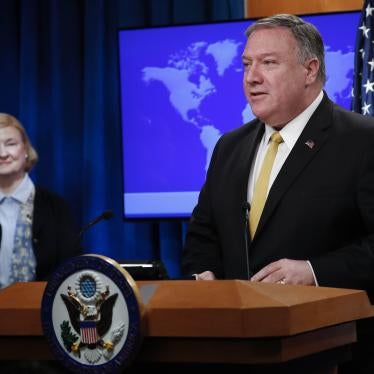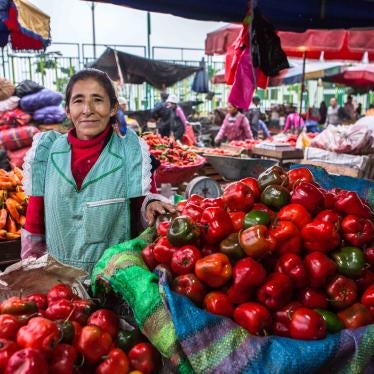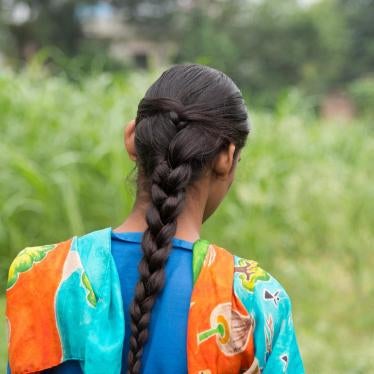On August 19, 2020, the United States Agency for International Development (USAID) released its draft 2020 Gender Equality and Female Empowerment Policy. According to the draft, this policy “supersedes and replaces the 2012 Gender Equality and Female Empowerment Policy in its entirety.”
Human Rights Watch writes today to raise its most significant concerns with the draft policy. Given that USAID has provided less than five full business days, with a last-minute extension of 2 days, to provide comments and feedback on the 40-page draft policy, we urge further discussion of the policy, including through meaningful and transparent civil society engagement, to ensure that it reflects the needs and opportunities of the current moment to advance gender equality globally. Such a short window for written comments, particularly during a global pandemic, is insufficient and makes engagement by many non-US-based organizations impacted by the policy nearly impossible.
Noting that our concerns with the draft policy are much broader, Human Rights Watch takes this opportunity to raise two overarching concerns:
- “Unalienable rights” is a term with no legal significance and subverts the established framework of internationally recognized and binding human rights.
The draft policy begins by stating that USAID “believes that gender equality and women’s empowerment are fundamental for the realization of unalienable human rights and key to effective and sustainable development outcomes.” Human Rights Watch opposes the introduction of the term “unalienable” into the phrase “realization of human rights.” Internationally agreed-upon and binding human rights treaties, and mechanisms for interpreting human rights obligations of states, already exist at international and regional levels. Inserting the term “unalienable” into the USAID gender policy appears to reflect a shift by the agency away from internationally recognized human rights and continues a pattern whereby the United States shies away from its international human rights commitments.
The term “unalienable rights” is clearly a reference to the work of the State Department’s Commission on Unalienable Rights, which Human Rights Watch has consistently criticized[1] as advancing the harmful idea that governments can decide which rights to respect and that the United States can unilaterally establish a hierarchy of rights. Such an approach is likely to fragment and weaken the international human rights system rather than strengthen its promise of greater gender equality and the realization of all rights for all people.
Throughout the draft, the policy also qualifies rights with terms like “basic” or “legal” rights, reducing the process of respecting and promoting women’s human rights simply to ensuring their recognition in domestic law, without recognizing the broader context for the realization of those rights. Legal barriers may exist that prevent the realization of human rights, and removing those barriers should be a priority. However, Human Rights Watch research[2] has repeatedly shown that governments often violate women’s human rights or fail to achieve gender equality by failing to implement laws or policies, or by accepting rights-infringing social norms or practices. The human rights obligations of states to achieve gender equality cannot be reduced to ending de jure discrimination at the expense of the full realization of human rights and achievement of substantive equality.
As a result of this distorted framing of rights, the draft policy fails to adequately address women’s economic rights, including rights to health, to dignity and safety at work, and to equitable distribution of property. While global health is a significant proportion of USAID funded work, the draft policy entirely omits the right to health and to non-discrimination against women in accessing it, including any discussion of the importance of women’s sexual and reproductive health and rights. When discussing harassment in the workplace, the draft policy fails to mention the significant step forward made last year to adopt global standards through a treaty aimed at ending violence and harassment at work.[3] This oversight detracts from global efforts to ratify the treaty. Further, when highlighting the importance of women’s property rights, the policy should address the need to ensure the equitable distribution of matrimonial property, including at the dissolution of marriage.
- The policy lacks an inclusive approach to addressing gender equality that recognizes how gender discrimination intersects with other forms of discrimination.
The 2012 policy was explicitly “inclusive of all women and men, girls and boys, regardless of age, sexual orientation, gender identity, disability status, religion, ethnicity, socioeconomic status, geographic area, migratory status, forced displacement or HIV/AIDS status.” By glaring contrast, this draft policy makes no reference to gender identity, sexual orientation or sex characteristics, religion, ethnicity or race, socioeconomic status, geographic area, migratory status, forced displacement, or HIV/AIDS status as intersecting identities that might affect the achievement of gender equality. Age and disability are mentioned in just one passing reference. This omission raises concerns that implementation of the policy will be insufficiently attentive to intersectional forms of discrimination.
Human Rights Watch research has shown that while all women and girls face some forms of discrimination that constitute obstacles to achieving gender equality, not all women and girls experience discrimination in the same way. Marginalization based on various identities increases the risk of human rights abuses, and requires increased attention. For example, in Lebanon, transgender women are at heightened risk of being arrested, questioned, or treated violently by law enforcement because of their gender identity.[4] In the United States, Black women are more than three times as likely to die from pregnancy-related complications[5] as white women, and low-income women and women of color are more likely to die from cervical cancer than white women.[6] In India, women and girls with disabilities face particular challenges accessing justice after being subjected to sexual violence.[7] Governments’ human rights obligations to end discrimination require them to consider these intersecting forms of discrimination, and doing so can improve development efforts by donor governments like the United States.
It is particularly harmful to strike inclusive language from this policy at a moment of heightened awareness in the United States of the intersecting forms of discrimination that lead to disproportionate rates of mortality and morbidity from Covid-19 and other diseases, from impacts of climate change, and from state violence. The draft policy’s disregard for the current global context is further evident in its failure to address the Covid-19 pandemic and the climate crisis. Evidence[8] already shows how these global crises are disproportionately harming people based on intersecting marginalized identities, including gender identities.
* * *
USAID’s 2012 Gender Equality and Female Empowerment Policy stated that “gender equality and female empowerment are now universally recognized as core development objectives, fundamental for the realization of human rights, and key to effective and sustainable development outcomes.” Gender equality is instrumentally important for the realization of human rights, but the achievement of equality and non-discrimination is also a human rights obligation in and of itself. The 2020 draft policy should be substantially revised to reflect a genuine commitment to equality and non-discrimination.
[1] Human Rights Watch Comment to the Commission on Unalienable Rights, July 30, 2020, https://www.hrw.org/sites/default/files/media_2020/07/HRW%20Comment%20to%20Commission%20on%20Unalienable%20Rights_0.pdf.
[2] “Women’s Rights,” Human Rights Watch, accessed August 24, 2020, https://www.hrw.org/topic/womens-rights.
[3] “End Violence, Harassment at Work,” Human Rights Watch news release, June 18, 2020, https://www.hrw.org/news/2020/06/18/end-violence-harassment-work.
[4] Human Rights Watch, “Don’t Punish Me for Who I Am”: Systemic Discrimination Against Transgender Women in Lebanon (New York: Human Rights Watch, 2019), https://www.hrw.org/report/2019/09/03/dont-punish-me-who-i-am/systemic-discrimination-against-transgender-womenlebanon.
[5] Human Rights Watch, “Prepared Testimony to US House of Representatives Ways and Means Committee,” June 10, 2020, https://www.hrw.org/news/2020/06/10/human-rights-watch-testimony-us-house-representatives-ways-and-means-committee.
[6] Human Rights Watch, It Should Not Happen: Alabama’s Failure to Prevent Cervical Cancer Death in the Black Belt (New York: Human Rights Watch, 2018), https://www.hrw.org/report/2018/11/29/it-should-not-happen/alabamas-failure-prevent-cervical-cancer-death-black-belt.
[7] Human Rights Watch, Invisible Victims of Sexual Violence: Access to Justice for Women and Girls with Disabilities in India,” (New York: Human Rights Watch, 2018), https://www.hrw.org/report/2018/04/03/invisible-victims-sexual-violence/access-justice-women-and-girls-disabilities.
[8] Human Rights Watch, “Submission to the UN special rapporteur on violence against women, its causes and consequences regarding COVID-19 and the increase of domestic violence against women,” July 3, 2020, https://www.hrw.org/news/2020/07/03/submission-un-special-rapporteur-violence-against-women-its-causes-and-consequences.








